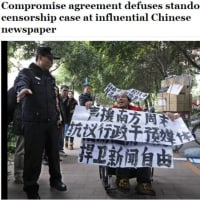The Yomiuri Shimbun(May. 18, 2009)
Kyoto Protocol overreach must not be repeated
CO2中期目標 「京都」の二の舞いを避けよ(5月18日付・読売社説)
To what extent should the amount of carbon dioxide and other greenhouse gas emissions be reduced by 2020? As the government is finalizing a mid-term goal on the issue, it is important to set a realistic and achievable numerical target.
二酸化炭素(CO2)など温室効果ガスの排出量を2020年までにどれだけ削減するか。大詰めを迎えた中期目標の策定に当たっては、実現可能な数値にすることが何より重要である。
Prime Minister Taro Aso is to finalize the nation's mid-term goal in June. As the basis for discussions, a government panel has presented six options whose emission targets range from an increase of 4 percent to a decrease of 25 percent in comparison to the 1990 level.
麻生首相は、日本としての中期目標を6月に最終決定する。それを前に、政府の懇談会が、1990年比で4%増から25%減までの六つの選択肢を示した。
A mid-term goal would be important since it would directly link to a new international framework on emission cuts that will succeed the Kyoto Protocol in 2013. Numerical targets that the government hammers out likely will become the minimum level that Japan is to take on under the post-Kyoto accord framework, for which talks are set to be completed by the end of this year.
中期目標が重要なのは、2013年以降の国際的な枠組みとなる「ポスト京都議定書」に直結するためである。政府が打ち出す数値が、今年末に交渉期限を迎えるポスト京都で日本に課せられる削減率の最低ラインとなるだろう。
The European Union has declared a mid-term goal of reducing emissions by 20 percent from the 1990 level. The United States hopes to cut its emissions to the 1990 level. Environment Minister Tetsuo Saito has said that Japan also needs to have "an ambitious goal."
欧州連合は90年比20%減という中期目標を掲げている。米国の目標は90年と同レベルにすることだ。斉藤環境相は「日本も野心的な目標が必要だ」としている。
===
Don't set unreachable goal
But setting a goal that is too demanding likely would prove troublesome for the nation, as the Kyoto Protocol has shown.
だが、過度な目標設定は、自らの首を絞めることになる。京都議定書がそれを物語っている。
For Japan, which already has advanced energy-saving systems, it is difficult to achieve the reduction of 6 percent from the 1990 level as stipulated in the Kyoto Protocol. Despite its strained fiscal situation, the nation has set aside about 200 billion yen over the last four years to purchase emission quotas from other nations in order to cover the shortfall in the reduction target.
省エネルギーが進んだ日本にとって、京都議定書で課せられた90年比6%減の達成は困難だ。実際、厳しい財政事情にもかかわらず、この4年間で約2000億円を計上して他国から排出枠を購入し、削減の不足分を補っている。
This kind of foolishness must not be repeated.
このような愚策を繰り返してはならない。
Under the post-Kyoto Protocol framework, it would be essential that China and India be required to fulfill their respective responsibilities as large emitters. To get the two nations to join the same framework, advanced nations need to show a willingness to cooperate on emission cuts.
ポスト京都では、大量排出国の中国、インドも応分の責任を果たすことが不可欠である。両国を同じ枠組みに引き入れるには、先進国が協調して排出量を削減する姿勢を示す必要があるだろう。
For Japan, however, it is not an easy task to achieve the same level of reduction as the United States and some other nations that still have much to do to cut emissions. How to ensure fairness among advanced nations in this regard is a key concern as well.
ただ、日本にとって、削減余地の大きい米国などと同じ割合を減らすのは容易でない。先進国間でどのように公平性を確保するかも重要なポイントである。
===
Seek realistic target
The six proposed options include one under which a reduction target is set at 25 percent for advanced nations as a whole with those nations being assigned different target rates in accordance with the degree of progress made in their energy-saving efforts. Under this scenario, Japan would have a target of an increase of 1 percent to a decrease of 5 percent from the 1990 level. This seems to be a realistic idea.
六つの選択肢の中に、先進国全体の削減率を25%として、省エネの進み具合に応じ、各国に削減率を割り振る方式がある。これだと日本は「1%増~5%減」になる。現実的な考え方といえよう。
Another option sets a target of 7 percent reduction with maximum use of cutting-edge energy-saving technology. This scenario is based on such an assumption that half of new cars sold are next-generation models. It is difficult to determine the feasibility of this option.
最先端の省エネ機器を最大限導入し、「7%減」を目指す選択肢もある。販売される新車の半数が次世代自動車になることなどを想定している。実現の可能性を見極めるのはなかなか難しい。
Japan has a long-term goal of reducing emissions by 60 percent to 80 percent from the current level by 2050. To achieve that goal it is important to try to establish a society that does not rely on oil and other fossil fuels.
日本は50年に現状より60~80%削減するという長期目標を掲げている。これを目指し、石油などに依存しない脱化石燃料社会の構築に努力するのは大切なことだ。
What should be done in the process of setting a mid-term goal is to build the foundations of a society that does not rely on fossil fuels, rather than to compete over levels of emission reduction rates.
削減率を競うより、脱化石燃料社会の基盤を築く。それが中期目標の期間になすべきことだ。
(From The Yomiuri Shimbun, May 18, 2009)
(2009年5月18日02時02分 読売新聞)
Kyoto Protocol overreach must not be repeated
CO2中期目標 「京都」の二の舞いを避けよ(5月18日付・読売社説)
To what extent should the amount of carbon dioxide and other greenhouse gas emissions be reduced by 2020? As the government is finalizing a mid-term goal on the issue, it is important to set a realistic and achievable numerical target.
二酸化炭素(CO2)など温室効果ガスの排出量を2020年までにどれだけ削減するか。大詰めを迎えた中期目標の策定に当たっては、実現可能な数値にすることが何より重要である。
Prime Minister Taro Aso is to finalize the nation's mid-term goal in June. As the basis for discussions, a government panel has presented six options whose emission targets range from an increase of 4 percent to a decrease of 25 percent in comparison to the 1990 level.
麻生首相は、日本としての中期目標を6月に最終決定する。それを前に、政府の懇談会が、1990年比で4%増から25%減までの六つの選択肢を示した。
A mid-term goal would be important since it would directly link to a new international framework on emission cuts that will succeed the Kyoto Protocol in 2013. Numerical targets that the government hammers out likely will become the minimum level that Japan is to take on under the post-Kyoto accord framework, for which talks are set to be completed by the end of this year.
中期目標が重要なのは、2013年以降の国際的な枠組みとなる「ポスト京都議定書」に直結するためである。政府が打ち出す数値が、今年末に交渉期限を迎えるポスト京都で日本に課せられる削減率の最低ラインとなるだろう。
The European Union has declared a mid-term goal of reducing emissions by 20 percent from the 1990 level. The United States hopes to cut its emissions to the 1990 level. Environment Minister Tetsuo Saito has said that Japan also needs to have "an ambitious goal."
欧州連合は90年比20%減という中期目標を掲げている。米国の目標は90年と同レベルにすることだ。斉藤環境相は「日本も野心的な目標が必要だ」としている。
===
Don't set unreachable goal
But setting a goal that is too demanding likely would prove troublesome for the nation, as the Kyoto Protocol has shown.
だが、過度な目標設定は、自らの首を絞めることになる。京都議定書がそれを物語っている。
For Japan, which already has advanced energy-saving systems, it is difficult to achieve the reduction of 6 percent from the 1990 level as stipulated in the Kyoto Protocol. Despite its strained fiscal situation, the nation has set aside about 200 billion yen over the last four years to purchase emission quotas from other nations in order to cover the shortfall in the reduction target.
省エネルギーが進んだ日本にとって、京都議定書で課せられた90年比6%減の達成は困難だ。実際、厳しい財政事情にもかかわらず、この4年間で約2000億円を計上して他国から排出枠を購入し、削減の不足分を補っている。
This kind of foolishness must not be repeated.
このような愚策を繰り返してはならない。
Under the post-Kyoto Protocol framework, it would be essential that China and India be required to fulfill their respective responsibilities as large emitters. To get the two nations to join the same framework, advanced nations need to show a willingness to cooperate on emission cuts.
ポスト京都では、大量排出国の中国、インドも応分の責任を果たすことが不可欠である。両国を同じ枠組みに引き入れるには、先進国が協調して排出量を削減する姿勢を示す必要があるだろう。
For Japan, however, it is not an easy task to achieve the same level of reduction as the United States and some other nations that still have much to do to cut emissions. How to ensure fairness among advanced nations in this regard is a key concern as well.
ただ、日本にとって、削減余地の大きい米国などと同じ割合を減らすのは容易でない。先進国間でどのように公平性を確保するかも重要なポイントである。
===
Seek realistic target
The six proposed options include one under which a reduction target is set at 25 percent for advanced nations as a whole with those nations being assigned different target rates in accordance with the degree of progress made in their energy-saving efforts. Under this scenario, Japan would have a target of an increase of 1 percent to a decrease of 5 percent from the 1990 level. This seems to be a realistic idea.
六つの選択肢の中に、先進国全体の削減率を25%として、省エネの進み具合に応じ、各国に削減率を割り振る方式がある。これだと日本は「1%増~5%減」になる。現実的な考え方といえよう。
Another option sets a target of 7 percent reduction with maximum use of cutting-edge energy-saving technology. This scenario is based on such an assumption that half of new cars sold are next-generation models. It is difficult to determine the feasibility of this option.
最先端の省エネ機器を最大限導入し、「7%減」を目指す選択肢もある。販売される新車の半数が次世代自動車になることなどを想定している。実現の可能性を見極めるのはなかなか難しい。
Japan has a long-term goal of reducing emissions by 60 percent to 80 percent from the current level by 2050. To achieve that goal it is important to try to establish a society that does not rely on oil and other fossil fuels.
日本は50年に現状より60~80%削減するという長期目標を掲げている。これを目指し、石油などに依存しない脱化石燃料社会の構築に努力するのは大切なことだ。
What should be done in the process of setting a mid-term goal is to build the foundations of a society that does not rely on fossil fuels, rather than to compete over levels of emission reduction rates.
削減率を競うより、脱化石燃料社会の基盤を築く。それが中期目標の期間になすべきことだ。
(From The Yomiuri Shimbun, May 18, 2009)
(2009年5月18日02時02分 読売新聞)



















※コメント投稿者のブログIDはブログ作成者のみに通知されます